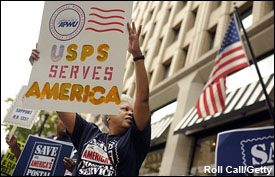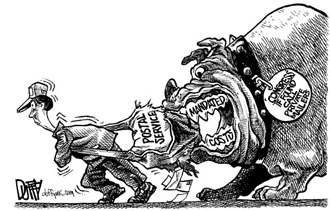LOCAL
Local hunger strikers to protest Congress starving the USPS
Three local members of the American Postal Workers Union (APWU) will stage a hunger strike in Washington state June 25 through 28, in solidarity with their fellow unionists and community activists in Washington, D.C. and other locations throughout the nation. The local APWU hunger strikers, Clint Burelson from Olympia, Anthony Foster from Tacoma, and David Yao from Seattle, contend that U.S. Postal Service cuts are a direct result of a 2006 law that pumps more than $5 billion per year from USPS coffers into the Federal Treasury. They say Congress is responsible for its failure to reverse that law.
Labor and community supporters of the hunger strikers are invited to join them as they carry out public protests across the state:
OLYMPIA — Monday, June 25, 1-2 p.m. at the Main Post Office, 900 Jefferson St. SE
VANCOUVER — Monday, June 25, 4-5 p.m. at the Main Post Office, 2700 Caples Ave.
PASCO — Tuesday, June 26, 4-5 p.m. at the Post Office, 3500 West Court St.
WENATCHEE — Wednesday, June 27, 4-5 p.m. at the Post Office, 301 Yakima St.
SEATTLE — Thursday, June 28, 5-6 p.m. at the Federal Building, 915 2nd Ave.
Activists will carry a large facsimile check for $22 billion, representing the amount paid by the USPS to the U.S. Treasury from 2006-2011.
 BACKGROUND — Hunger Strike actions in Washington, D.C. will be staged on the U.S. Capitol grounds to illustrate that America’s postal service is being starved financially by Congress. The hunger strikes occur after announced cuts of 25-75% in hours for many small offices, and just days before the July 1 slowdown of some first-class mail. They will highlight the connection between loss of service to postal customers, and congressional delay in fixing overpayments into federal benefit funds.
BACKGROUND — Hunger Strike actions in Washington, D.C. will be staged on the U.S. Capitol grounds to illustrate that America’s postal service is being starved financially by Congress. The hunger strikes occur after announced cuts of 25-75% in hours for many small offices, and just days before the July 1 slowdown of some first-class mail. They will highlight the connection between loss of service to postal customers, and congressional delay in fixing overpayments into federal benefit funds.
“Not the internet, not private competition, not the recession — Congress is responsible for the postal mess,” said Jamie Partridge, a retired letter carrier traveling from Portland, Ore., for the hunger strike in D.C. “Corporate interests, working through their friends in Congress, want to undermine the USPS, bust the unions then give the work to private, for-profit interests.”
David Yao of Seattle, a 26-year postal employee who will be traveling throughout the state while on hunger strike, said, “Big cuts in hours at small offices throughout the state are not necessary. Delaying first-class mail, starting July 1, is not necessary. Reducing delivery days and ending door-to-door delivery are not necessary. But Congress will not stop the needless transfer of $5.5 billion annually from the postal budget onto the federal budget. They are using the Post Office as a cash cow.”
 The activists claim that a 2006 Congressional mandate, which forces the USPS to prefund 75 years worth of retiree health benefits in a ten-year window, accounts for the bulk of losses that are sending the service into a death spiral.
The activists claim that a 2006 Congressional mandate, which forces the USPS to prefund 75 years worth of retiree health benefits in a ten-year window, accounts for the bulk of losses that are sending the service into a death spiral.
Not only would the postal service have been profitable from 2007-2010 without the mandate, say the strikers, the USPS has also overpaid tens of billions into two pension funds.
U.S. Postmaster General Patrick Donahoe announced in May that he would begin closure of half the mail sorting plants in the country, which would delay most first-class mail delivery. He also announced plans to cut hours in half the nation’s post offices, mostly in rural areas.
On July 1, next-day delivery of first-class mail will be reduced to mailings within local distribution areas (there are five in Western Washington, and four east of the Cascades) . As of Feb. 1, 2013, next-day first class mail will be completely eliminated for the mailing public, unless Congress releases sufficient postal funds.
The hunger strikers are calling on Postmaster Donahoe to suspend cuts and closures, and calling on Congress to immediately fix the finances by repealing the prefunding mandate and refunding the pension surplus.





